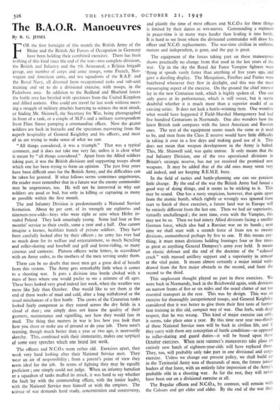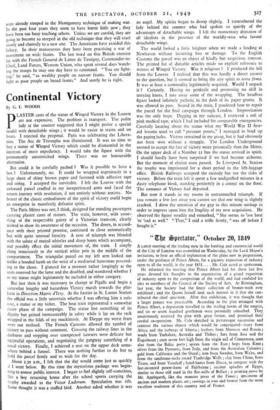The B.A.O.R. Manoeuvres
By R. G. JESSEL
FOR the first fortnight of this month the British Army of the Rhine and the British Air Forces of Occupation in Germany have been holding their combined exercises. There has been nothing of this kind since the end of the war—two complete divisions, the British znd Infantry and the 7th Armoured, a Belgian brigade
group, any number of corps and army troops, some French, Nor- wegian and American units, and ten squadrons of the R.A.F. and the Royal Navy, all diverted from occupational tasks and sub-unit training and set to do a divisional exercise, with troops, in the Paderborn area. In addition to the Redland and Blueland forces the battle area has bristled with spectators from the United Kingdom and Allied nations. One could not travel far last week without meet- ing a straggle of military attaches hurrying to witness the next attack, or finding Mr. Shinwell, the Secretary for War, being photographed in front of a tank, or a couple of M.P.s and a military correspondent from Fleet Street pumping a commanding officer. Now the 40,000 soldiers are back in barracks and the spectators recovering from the superb hospitality of General Keightley and his officers, and most of us arc trying to make sense of what we saw.
"All things considered, it was a triumph." That was a typical comment, and it does not take one very far, unless it is clear what is meant by "all things considered." Apart from the Allied soldiers taking part, it was the British divisions and supporting troops about which one has been trying to form an opinion. The past four years have been difficult ones for the British Army, and the difficulties can be taken for granted. If what follows seems sometimes ungenerous, the reader must remember that in a future war the enemy commander may be ungenerous, too. He will not be interested in why our soldiers are good or bad, but only in killing or capturing as many as possible within the first month.
The znd Infantry Division is predominantly a National Service formation. About 60 per cent. of its strength are eighteen- and nineteen-year-olds--boys who were eight or nine when Hitler in- vaded Poland. They look amazingly young. Some had four or five months' service to their credit, some a year and a half. One cannot imagine a keener, healthier bunch of private soldiers. They have been carefully looked after by their officers ; no army has ever had so much done for its welfare and entertainment, so much bicycling and roller-skating and baseball and golf and horse-riding, so many cinemas and canteens. Platoon officers write letters, in accordance with an Army order, to the mothers of the men serving under them.
There can be no doubt that most men get a great deal of benefit from this system. The Army gets remarkably little when it comes to a shooting war. It puts a division into battle choked with a mass of boys where one would prefer to see a mixture of all ages. These boys looked very good indeed last week, when the weather was more like July than October. One would like to sec them at the end of three weeks of mud and cold, after a long withdrawal or the usual mischances of a first battle. The crews of the Centurion tanks looked fairly competent as they roared across the dry fields in a cloud of dust ; one simply does not know the quality of their gunnery, maintenance and signalling, nor how they would fare in mud. The thing that matters in war is less how you look than how you shoot or make use of ground or do your job. These men's training, though much better than a year or two ago, is necessarily sketchy. This, combined with their immaturity, makes one sceptical of some easy speeches which one heard last week.
The officers and N.C.O.s seem rather old. Exercises apart, they work very hard looking after their National Service men. They wear an air of responsibility ; from a parent's point of view they seem ideal for the job.. In terms of fighting they may be equally proficient; one simply could not judge. When an infantry battalion or a squadron of tanks muffed its attack, it was hard to say whether the fault lay with the commanding officer, with the junior leader, with the National Service man himself or with the umpires. The science of war demands hard study, concentration and controversy,
and plainly the time of most officers and N.C.O.s for these things is limited by their duties as wet-nurses. Commanding a regiment in peace-time is in many ways harder than leading it into battle. It is hard to see from where the divisional commander will draw his officer and N.C.O. replacements. The war-time civilian in uniform. mature and independent, is gone, and the gap is great.
The equipment of the forces taking part on these manoeuvres shows practically no change from that used in the last years of the war. Up in the sky the Royal Air Force Vampire fighters were • flying at speeds vastly faster than anything of five years ago, and gave a dazzling display. The Mosquitoes, Fireflies and Furies were butchered whenever they flew in daylight, and this was the most encouraging aspect of the exercise. On the ground the chief interest lay in the new Centurion tank, which is highly spoken of. One can only guess at its performance, which is still secret, but it seems doubtful whether it is much more than a superior model of an existing series. It does not look a battle-winning item. One wonders what would have happened if Field-Marshal Montgomery had had five hundred Centurions in Normandy. One also wonders how the latest British tank compares with the latest American and Russian ones. The rest of the equipment seems much the same as it used to be, and men from the Class Z reserve would have little difficulty in taking it over in a few days and making good use of it. This does not mean that weapon development in the Army is halted.
This, Mr. Shinwell said, was quite untrue. It only means that the znd Infantry Division, one of the two operational divisions in Britain's strategic reserve, has not yet received the promised new weapons. It may be added that of the old ones many seem very old indeed, and are keeping R.E.M.E. busy.
In the field of tactics and battle-planning one can see precious little change. By the end of the war the British Army had found a good way of doing things, and it seems to be sticking to it. This may be sound. One has a nasty suspicion, however, that quite apart from the atomic bomb, which rightly or wrongly was ignored from start to finish of these exercises, a future land war in Europe will be entirely different from the last one. Then we had air superiority, virtually unchallenged ; the next time, even with the Vampire, this may not be so. Then we had ninety Allied divisions facing a smaller German force, which also had a Russian war on its hands ; next time we shall start with a scratch force of from ten to twenty divisions, outnumbered perhaps by five to one. If this means any- thing, it must mean divisions holding frontages four or five times as great as anything General Dempsey's army ever held. It means an elastic defence and the end of the doctrine of the "colossal crack" with massed artillery support and a superiority in armour at the vital point. It means almost certainly a major initial with- drawal from the first major obstacle to the second, and from the second to the third.
This unpleasant thought played no part in these exercises. We were back in Normandy, back in the Reichswald again, with divisions on narrow fronts of five or six miles and the usual clutter of not too essential transport in the rear. This was by design. This was an exercise for thoroughly inexperienced troops, and General Keightley considered that it was better to give them their first taste of forma- tion training in this old, compact way of war. One feels, with deep respect, that he was wrong. This kind of major exercise can only, it seems, take place once a year. By this time next year two-thirds of these National Service men will be back in civilian life, and if they carry with them any conception of battle conditions—as opposed to roller-skating and guard duties—it will be based upon these October exercises. When next summer's manoeuvres take place an entirely new batch of eighteen-year-olds will have replaced them. They, too, will probably only take part in one divisional and corps exercise. Unless we change our present policy, we shall build up in the Territorial Army tens of thousands of men, the future junior leaders of that force, with an entirely false impression of the Army's probable role in a shooting war. As for the rest, they will never have been out on a divisional exercise at all.
The Regular officers and N.C.O.s, by contrast, will remain with the Colours and get older and older. By the end of the war they were already steeped in the Montgomery technique of making war. In the past four years they seem to have learnt little pew; they have been too busy teaching others. Unless we are careful, they are going to become so steeped in the old technique that they will react slowly and clumsily to a new one. The Americans have avoided this fallacy. In their manoeuvres they have been practising a war of movement on wide fronts. The last word on this British exercise lay with the French General de Lattre de Tassigny, Commander-in- Chief, Land Forces, Western Union, who spent several days Watch- ing the troops he may one day have to command. "You are fight- ing," he said, "as wealthy people on narrow fronts. You should fight as poor people on broad fronts." And surely he is right.



































 Previous page
Previous page